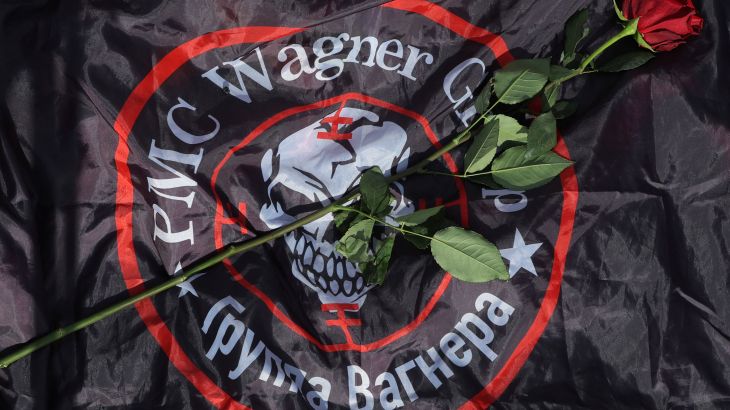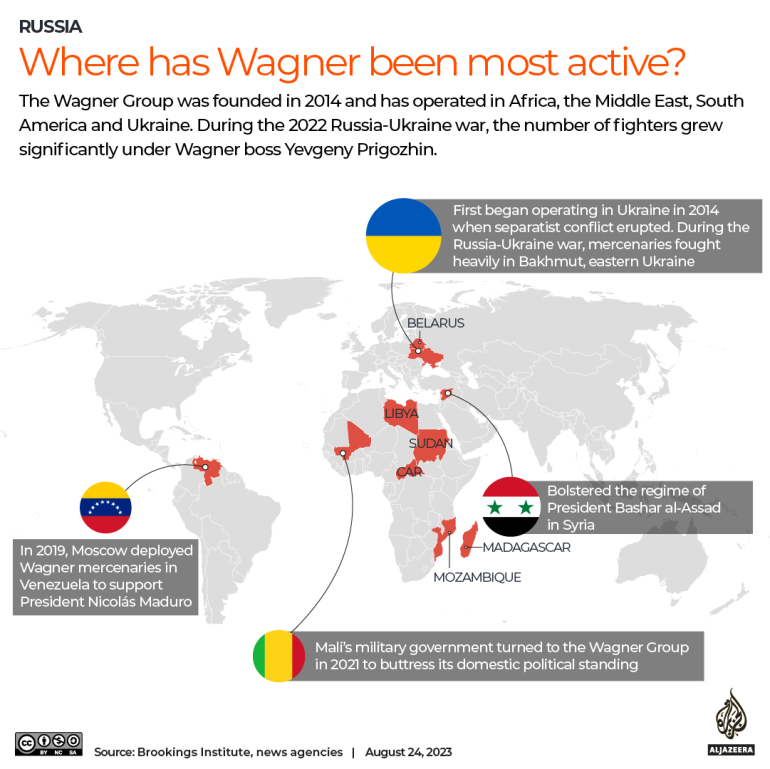Mansur Mirovalev

Kyiv, Ukraine – The Kremlin says it is at odds about the future of the Wagner Group, Russia’s largest and most notorious private military company.
“I can’t tell you anything now, I don’t know. Legally, no such structure exists,” Kremlin spokesman Dmitry Peskov said on Friday, two days after Wagner’s head Yevgeny Prigozhin and his top brass died in a plane crash that Western officials claim was caused by an explosion.
But observers tell Al Jazeera that Wagner’s battle-tested fighters are too valuable to just be disbanded and let go.
What and who is left of Wagner is already being torn apart by Russia’s military, intelligence services, state-run corporations and private military companies (PMCs) financed by Kremlin allies or oligarchs – and even Belarusian President Alexander Lukashenko may get his share.
Since 2014, Wagner employed thousands of experienced fighters of starkly different backgrounds. Some graduated from elite military and intelligence units, some fought for Moscow in Chechen wars, and some hailed from criminal groups that mushroomed in the former Soviet Union in the 1990s.
Last year, Wagner enlisted tens of thousands of inmates from Russian jails who were promised hefty paycheques and presidential pardons, but were largely used in what is known as “meat marches” on Ukrainian positions.
Few survived in what bled Ukrainian forces dry and stalled Kyiv’s counteroffensive, and even fewer stayed on.
Given the survivors’ battlefield prowess, the biggest question is whether the Kremlin would try to preserve Wagner under new management – or create its full-fledged replicas.
Both options seem hardly feasible for now.

What made Wagner stand out was the business acumen and nefarious charisma of Prigozhin, whose out-of-the-box thinking, obscene, megalomaniac diatribes and insubordination were unprecedented in President Vladimir Putin’s Russia – and would make many James Bond movie villains pale in comparison.
The 62-year-old ex-convict – once known as “Putin’s chef” and blacklisted in the West – put together a business empire that traded in Syrian hydrocarbons, African diamonds, gold, timbre and raw materials.
He inked lucrative security deals with sub-Saharan autocrats, ran catering businesses and hotels in Russia and launched a troll farm that meddled in elections from Madagascar to the United States, spawning media outlets and Telegram channels.
Wagner was just the most visible jewel in his crown.
“Wagner was much more than just a PMC,” John Lechner, a US author who is writing a book about Prigozhin that summarises years of research in Africa, the Middle East, Russia and Ukraine, told Al Jazeera. “There’s really nothing quite like it that can replace it anytime soon.”
Ukraine’s top military expert agrees.
“Wagner is unique in its own way, and you need to credit Prigozhin with that,” Lieutenant General Ihor Romanenko, former deputy chief of the General Staff of the Armed Forces of Ukraine, told Al Jazeera.
Russia’s top brass “will hardly be able to form something similar in the nearest future”, Romanenko said.
Wagner’s most valuable and lethal resource – battle-tested, seasoned fighters – is up for grabs, he said.
“They will pull people apart, the process is already going on. Some will be removed, some fired. Some will move to other structures, some may be interested [in staying on] because they are well-trained storm troops.”
‘Not many’ Wagner fighters in Ukraine
Wagner has been cracking at the seams since Prigozhin’s aborted mutiny on June 23.
He said his “justice march” on Moscow that stopped 200km (125 miles) south of the Russian capital was triggered by a months-long feud with the defence ministry that had “sabotaged” ammunition supplies.
The march was also sparked by Moscow’s ultimatum that each Wagner fighter had to sign a contract to become a cog in Russia’s military machine, known for its ineffectiveness, poor decision-making and logistics that turned Putin’s Ukrainian blitzkrieg into a quagmire with no end in sight.
Lukashenko brokered a truce between Prigozhin and the Kremlin, guaranteeing that Wagner fighters who did not want to sign up could relocate to Belarus.
Thousands already did and settled in camps built for them in the dense Belarusian forests that once hid World War II guerrillas fighting German Nazis.
“The most qualified part of them will get Belarusian citizenship and will be integrated in Belarusian law enforcement structures,” Belarusian-born, Kyiv-based analyst Igar Tyshkevich told Al Jazeera.
The recruits will help Lukashenko counter Moscow’s efforts to complete its subjugation of his ex-Soviet nation of 10 million people.
Lukashenko will try to force the rest of Wagner fighters back to Russia, where the military, intelligence services and state companies are already trying to fill the vacuum left by Prigozhin’s death, Tyshkevich said.
For example, Lukoil, Russia’s second-largest energy company, has long had its own security company launched by former special intelligence operations officers with the Soviet-era KGB.
In November, the Kremlin allowed Russian corporations to form their own private military companies and Lukoil’s security service, Lukom-A, has been “actively boosting its military potential” to launch its own PMC, Tyshkevich said.
Similarly, security companies affiliated with Putin’s allies or Kremlin-controlled energy giants would keep in contact with what remains of Wagner to develop their own private military companies, he said.
Some Wagner fighters would prefer to maintain their independence and will “turn into a standard group of mercenaries or a private military company”.
Others will become part of state corporations or intelligence services and some have already signed contracts with the defence ministry, while those “pushed out” of Belarus may join them to fight in Ukraine, he added.
“But there won’t be many,” Tyshkevich said. “Wagner will fragment into several structures.”
Weaker replicas
“Experienced fighters went to the front line following their hearts to kick out [Ukrainian] nationalists,” an anchor with the Kremlin-controlled Channel One television network said in January, announcing a story about Fakel (Torch), another PMC.
The footage showed a dozen masked “ex-military officers” fighting in the southeastern Ukrainian region of Donetsk, shelling and storming Ukrainian trenches.
It did not mention Fakel’s financial backers but media reports suggest Gazprom, the Kremlin-controlled natural gas producer and exporter, pays its bills – and also funds at least two more PMCs – Potok (Flow) and Plamya (Flame).
Molfar, a Ukrainian open-source intelligence group, said that as of March, 25 Russian private military companies operated in Ukraine.
They had names such as Redoubt, Anti-Terror Eagle, and Yastreb (Hawk) and mostly employed ex-military officers.
Two-thirds of them allegedly had ties to Russia’s defence ministry and intelligence services, and six were “probably” funded by oligarchs such as Putin’s longtime ally Gennady Timchenko and aluminium tycoon Oleg Deripaska, Molfar claimed.
What unites them is the Kremlin’s push to avoid the official involvement and death of regular Russian servicemen in Ukraine.
“Mercenaries are gathered to bypass inter-institutional and other frameworks and limitations that can’t possibly be followed,” Pavel Luzin, a fugitive Russian defence analyst, told Al Jazeera.
Most of these PMCs are small and their fighters complain of poor supply chains and coordination with other units.
But their sponsors fulfil two goals: to help the Kremlin avoid another round of mobilisation and to show Putin their loyalty, Lechner said.
‘Prigozhin’s charisma’
In the eyes of Russian law, private military companies are still illegal, which makes their sponsors or members subject to prosecution if they disobey Moscow the way Prigozhin did.
But none have a chance to eclipse him.
“There’s plenty of military talent among the other commanders but Prigozhin’s charisma, his ability to bring things together as a logistician, as a manager – that would be difficult for them to replace in one man,” Lechner said.
But the war in Ukraine – along with Russia’s ambitions in other parts of the world – will likely keep these PMCs afloat and alive.
“Russian mercenaries are here to stay,” said Lechner. “It might be in a less charismatic form, but they’ve created the market for themselves and for others probably, too.”
No comments:
Post a Comment